| |

Traditions, folklore, history and more. If it's Irish, it's here. Or will be!
"People will not look forward to posterity who never look backward to their ancestors."
-Edmund Burke




Quotes
Library: Books, Movies, Music
Prints & Photos
Poetry
Jokes


Shops Ireland
Bunús na Gaeilge
(Basic Irish)
Circle of Prayer
Blessings
Did You Know?
Himself/Herself
Write to Us
Readers Write..
Links/Link to Us
Advertise with us
Awards & Testimonials
Submissions Guide

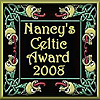
|
|
|
Mumming - a Yuletide Tradition
by Bridget Haggerty
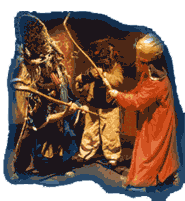 Hanner's Chronicle describes King Henry's celebration of Christmas in Dublin in 1172 as "...the sport, and the mirth, and the continual musicke, the masking, the mumming and strange shewes, the gold, the silver, and plate, the precious ornaments, the dainty dishes...." Hanner's Chronicle describes King Henry's celebration of Christmas in Dublin in 1172 as "...the sport, and the mirth, and the continual musicke, the masking, the mumming and strange shewes, the gold, the silver, and plate, the precious ornaments, the dainty dishes...."
While the origins of mumming and the Mummer's Play aren't definitive, it's obvious when one reads the verses of Irish traditional mumming that many of the characters, for example, St. George, are so closely related to England, that one must logically assume the custom was brought to Ireland by the British. But maybe not. For example, the masked tradition of 'mumming' in Ulster is said to date back 2500 years. In the ancient annals of Ulster, men in tall conical masks are mentioned as chief entertainers to King Conor, who lived at the royal fort of Emain Macha.
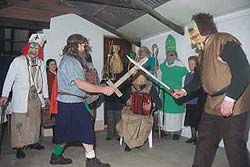 In more recent times, Christmas mumming plays were popular in medieval Irish towns. The records show that in Dublin in 1458, a different play was presented each day of Christmas week, on a stage at Hoggen Green. The carpenter's guild presented a nativity play; the shoemakers told the story of St. Crispin, their patron saint; the tailors portrayed Adam and Eve and still others presented more secular themes; the vintners showed Bacchus, the bakers, Ceres, and the blacksmiths Vulcan. To restore the spiritual air proper to the season, the leaders of the clergy presented the Passion of Our Lord and the Martyrdom of the Apostles. In more recent times, Christmas mumming plays were popular in medieval Irish towns. The records show that in Dublin in 1458, a different play was presented each day of Christmas week, on a stage at Hoggen Green. The carpenter's guild presented a nativity play; the shoemakers told the story of St. Crispin, their patron saint; the tailors portrayed Adam and Eve and still others presented more secular themes; the vintners showed Bacchus, the bakers, Ceres, and the blacksmiths Vulcan. To restore the spiritual air proper to the season, the leaders of the clergy presented the Passion of Our Lord and the Martyrdom of the Apostles.
In Ireland today, there has been a revival of mumming in some areas, notably in south Co, Wexford, where competitions between groups are held annually. These groups have performed in Dublin and elsewhere, have appeared on television, and have gone abroad to participate in international folk festivals.
In a Wexford Mummer's play, composed about the beginning of the 20th century, all of the characters are from Irish history - Colmcille, Brian Boru, Art MacMorrough, Owen Roe O'Neill, Sarsfield, Wolf Tone. Lord Edward, Lelly of Killane, Michael Dwyer, Robert Emmet and Fr. John Murphy, all led by a captain who calls on each to speak his lines.
Wexford mumming differs from all others in that the highlight of the performance is an intricate sword dance performed by 12 players, each with a wooden sword. Six players line up and the other six form a line opposite them. When the music begins, the players sway left and right and then, with their swords held above their heads, they make the outline of an upright figure eight. At a designated point in the ritual, the men commence a rhythmic "swordfight" - the sounds of the swords adding a dramatic accompaniment to the music. Apparently, it was a stirring and exciting spectacle, especially when the music was well done and the combatants kept good time.
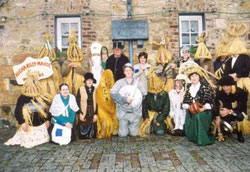 Besides the name Mummers, players are also known as Christmas Rhymers and Hogmanay Men. Traditionally, they performed during the twelve days of Christmas, although more recently, groups have travelled about at any time between mid-December and the end of January. Besides the name Mummers, players are also known as Christmas Rhymers and Hogmanay Men. Traditionally, they performed during the twelve days of Christmas, although more recently, groups have travelled about at any time between mid-December and the end of January.
Generally, mummer's plays are always in verse and usually the main theme is a combat between two heroes, the fall of one of them, and his revival by a doctor. The play brings to life characters such as St. Patrick and his battle with the Turkish Knight, Dick Darby the Cobbler, Slick Slack with the wife and children on his back, Big Head, Oliver Cromwell, and the Doctor with his bag of medicines and cures. The play is a succession of 'mini-dramas', each overlapping the other and keeping the audience and actors on their toes. Amidst the music and comedy are the universal themes of death and resurrection, and good triumphing over evil.
To end this brief look at the tradition of mumming, we'd be remiss if we didn't include a definition of the word itself. "Mum's the word" is an old saying which means keep quiet. This is where the term mummers derives from because the Middle English word mum means silent. Thus, mumming plays began as miming performances. Eventually, words were added, but the original stories have often been partially lost through translation and retellings of the story. It is also believed that these plays were performed around the end of the year and during the harvesting season because it was intended to be a celebration of the death of the year and its coming again in the Spring. Here are a few verses that are typically included in the Mummer's Play:
Here we stand before your door,
As we stood the year before;
Give us whiskey; give us gin,
Open the door and let us in.
Cure I can for a noble fee,
From your complaint, I'll set you free.
I can cure by day and night
I can diagnose by sight.
The plague it is no pague to me
Get it, kind sir, and I'll set you free.
God bless the master of this house
Likewise the mistress too,
May your barns be filled with wheat and corn
And your hearts be always true.
A merry Christmas is our wish
Where'er we do appear;
To you a well-filled purse, a well-filled dish
And a happy, bright New Year. (With thanks to Hartson Dowd who sent this one in)
With a rink tink rink and a sup more drink
We'll make the old bell sound
A merry Christmas to you all
May happiness abound.
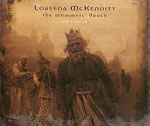 Our research also turned up a a tune called The Mummer's Dance sung by Loreena McKennitt, from her album The Book of Secrets. You can hear a snippet here: Our research also turned up a a tune called The Mummer's Dance sung by Loreena McKennitt, from her album The Book of Secrets. You can hear a snippet here:
The Mummer's Dance.
While we've never seen a Mummer's Play, we did catch the Armagh Rhymers at the Dublin, Ohio Irish festival a couple of years ago. If that brilliant act is anything to go by, we'd have to say that Irish Mumming, especially by this group, is very much alive and well!
Resources:
Content:
Kevin Danaher's The Year in Ireland
The Armagh Rhymers
Origins of mumming
Mummer's Play
Images:
Armagh Rhymers
Joe McGowna's Sligo Heritage website where you will find a great article on Mummers and Strawboys. As Joe points out, there is a difference and it's important to know that. We agree!
|
|
Fri, Sep 27, 2024
 The Galway Hooker The Galway Hooker
This unique vessel, with its distinctive curved lines and bright red sails, originated in the village of Claddagh. During the 19th century, hookers supported a significant fishing industry and also carried goods, livestock and fuel. Seán Rainey is remembered for building the last of the original boats, the Truelight, for Martin Oliver who was to become the last king of the Claddagh; as king, he was entitled to white sails on his boat. Since the mid seventies, many of the old sailing craft which were on the verge of extinction have been lovingly restored and new ones have been built. During the summer months they can be seen at festivals such a Cruinniú na mBád - the Gathering of the Boats - in Kinvara.
Click for More Culture Corner.
This study of Irish Christmas Mumming is a beautifully written exploration of a vanishing holiday ritual that can be traced back to the dramas of the 16th century. Extraordinarily rich and perceptive. Adapted from The Philadelphia Enquirer
Click here for All Silver and no Brass.
|
|
|
|
|




 The Galway Hooker
The Galway Hooker